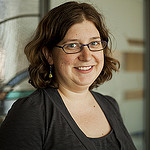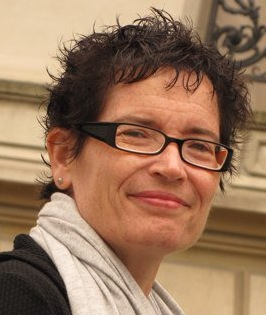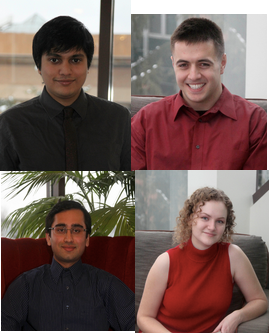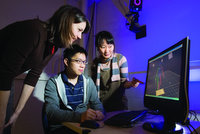Using Online Collaboration Tools to Improve Student Teamwork
Can technology help student teams improve their group process—and ultimately their learning? CRLT's recent Occasional Paper on "Teaching in the Cloud" explains some ways it can. In particular, the paper highlights how Online Collaboration Tools (OCTs) can enhance students' ability to collaborate effectively. OCTs can facilitate group members' access to one another and the team's efficiency by reducing spatial and temporal barriers. OCTs can also provide novel, efficient, and effective means for instructors to monitor and provide feedback on group projects.
The paper features two U-M faculty members who successfully utilize OCTs to improve student teamwork as well as instructor management of group projects.
 Robin Fowler of Technical Communication and Engineering: Fowler has improved student teamwork in Introduction to Engineering by shifting from face-to-face team meetings to synchronous, text-based online discussions. Her students share and assess design plans using Google Docs, a system that has increased student engagement and participation in group decision-making. To learn more, watch a short video of Fowler discussing this teaching strategy and some of its outcomes.
Robin Fowler of Technical Communication and Engineering: Fowler has improved student teamwork in Introduction to Engineering by shifting from face-to-face team meetings to synchronous, text-based online discussions. Her students share and assess design plans using Google Docs, a system that has increased student engagement and participation in group decision-making. To learn more, watch a short video of Fowler discussing this teaching strategy and some of its outcomes.
 Melissa Gross of Kinesiology: Gross's studio course uses 3D animation and motion capture technologies to study the biomechanics of human movement. Students' group presentations include such animations to illustrate their research findings, and these require sharing and collaborating on many large video files. Gross uses Box.net, a cloud-based storage and sharing service, to solve storage and capacity challenges and facilitate student management and coordination of their teamwork. To learn more, watch a short video of Gross discussing this teaching strategy.
Melissa Gross of Kinesiology: Gross's studio course uses 3D animation and motion capture technologies to study the biomechanics of human movement. Students' group presentations include such animations to illustrate their research findings, and these require sharing and collaborating on many large video files. Gross uses Box.net, a cloud-based storage and sharing service, to solve storage and capacity challenges and facilitate student management and coordination of their teamwork. To learn more, watch a short video of Gross discussing this teaching strategy.
For additional resources about using student teams effectively in a range of course settings, see this section of our website and this recent CRLT Occasional Paper.




 There's no question that students' writing improves most when they have frequent opportunities for practice and feedback. But instructors sometimes struggle to find ways to provide those opportunities, especially in large courses. One method that many U-M instructors use to good effect is structured peer review. These three faculty members--featured in CRLT's
There's no question that students' writing improves most when they have frequent opportunities for practice and feedback. But instructors sometimes struggle to find ways to provide those opportunities, especially in large courses. One method that many U-M instructors use to good effect is structured peer review. These three faculty members--featured in CRLT's 
 Have you ever wondered whether you're using PowerPoint effectively to enhance student learning in your classes? Or hoped you could learn how to do so? This coming Tuesday, CRLT Assistant Director Rachel Niemer will lead a seminar on strategies for designing presentation slides that successfully serve several purposes: an organizing platform for a lecture, a study guide for students after class, and a place for students to take notes during class. Informed by recent research on how students learn, the session will equip participants with techniques to avoid "Death by PowerPoint."
Have you ever wondered whether you're using PowerPoint effectively to enhance student learning in your classes? Or hoped you could learn how to do so? This coming Tuesday, CRLT Assistant Director Rachel Niemer will lead a seminar on strategies for designing presentation slides that successfully serve several purposes: an organizing platform for a lecture, a study guide for students after class, and a place for students to take notes during class. Informed by recent research on how students learn, the session will equip participants with techniques to avoid "Death by PowerPoint."  Although students can easily become passive learners in a traditional lecture setting, with the right approach lectures can be a very effective way to disseminate content efficiently to large numbers of students, to present cutting-edge material not available elsewhere, and to model expert thinking. Here are two examples of U-M instructors who have used OCTs in large courses to increase student interactions and engagement.
Although students can easily become passive learners in a traditional lecture setting, with the right approach lectures can be a very effective way to disseminate content efficiently to large numbers of students, to present cutting-edge material not available elsewhere, and to model expert thinking. Here are two examples of U-M instructors who have used OCTs in large courses to increase student interactions and engagement. 


